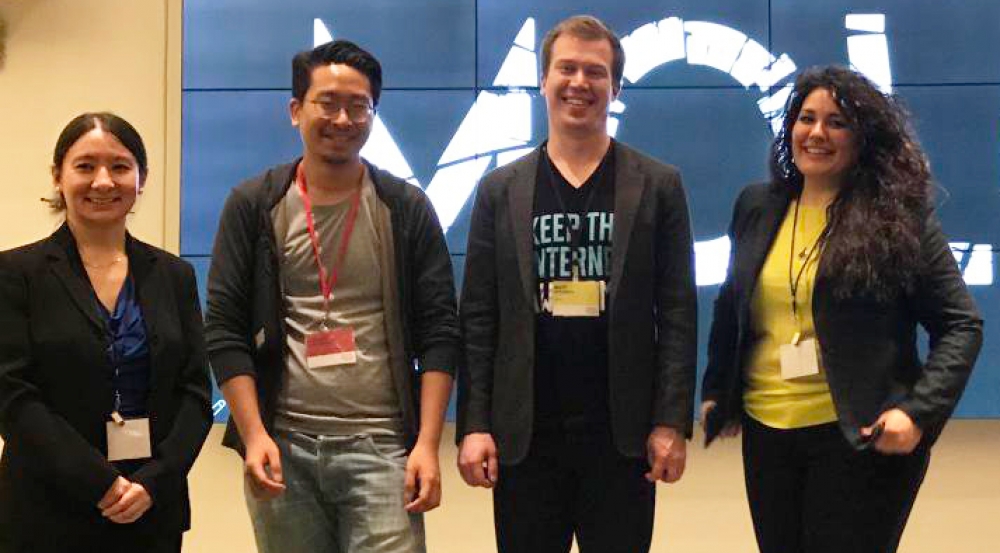Hacking intolerance with MIT Breaking the Mold

Breaking the mold means doing something in a new, untraditional way. This sentiment could describe MIT, where outside-the-box thinking yields technology that transforms the world. As enthusiastic as MIT is about innovation, it is also a diverse community that cares about social challenges. So, what if the innovative spirit at MIT was directed toward solving the social issues we face?
This was the question behind the MIT Breaking the Mold Hackathon held on 25 February. The event, which was open to the public, brought Laboratory staff together with more than 150 members of the MIT and local communities for an intense day of problem solving. Teams tackled issues within many dimensions of diversity, in the areas of hiring practices, race relations, gender equality, education, and online bias. The hackathon was a continuation of the MIT Breaking the Mold initiative, founded in 2014, which serves as a platform for promoting tolerance.
"I was drawn to the hackathon because it was an effort to address some real issues of inequality that many people have to deal with in America," said participant Jennifer Williams of Lincoln Laboratory's Human Language Technology Group. "Often, there is a lot of talk—people have different views and sometimes don't agree on a problem or that a problem even exists. This hackathon turned the talk into action."
Hosted at the MIT Media Lab, the event kicked off with an introduction of the near-dozen issues that would be hacked that day. Teams assembled and jumped into brainstorming solutions that leverage technology. Bakari Hassan of the Laboratory's Systems Engineering Group joined a team focused on hacking bias that people with foreign accents face during the hiring process. Groups at neighboring tables dug into a variety of other topics: bridging the partisan divide, improving relations between police and the community, and even designing a better sports bra.
I was drawn to the hackathon because it was an effort to address some real issues of inequality that many people have to deal with in America.
A morning of generating ideas launched into an afternoon of prototyping. Williams' team created a method to help close the gender pay gap. "Our approach was to find a way to take the onus off of the employee. We developed a metric for C-suite executives to use in their evaluations of middle managers. The metric was based on pay distribution skew of their teams," she said. In their system, middle managers would be awarded a bonus if a skew wasn't detected, and if there was a skew, the situation would be remedied.
Ngaire Underhill, a member of the Laboratory's Surveillance Systems Group, led a team faced with the issue of online harassment. The team prototyped a mobile application called "Superfriend" that notifies a user's friends if they are being harassed online and provides the friends with prewritten responses to address the harasser and to support the victim. At the end of the day, when each team presented its prototypes with one-minute pitches to a panel of judges, Underhill's team was awarded the "Impact Award."
The experience reminded Underhill that awareness is key to overcoming bias. "One of the most complex problems for many of these issues was being able to recognize when it is happening. By being more informed and hearing examples, everyone will walk away as someone who can identify when something unjust or unfair is occurring. Every single instance where someone stands up for another, or intervenes when they see something wrong, is preceded by their recognizing that something is wrong in the first place."
The event attendees brought their diverse perspectives to the effort. Students, technology experts, industry professionals, diversity activists, and people new to social-issue discussions worked side by side. A man from Thailand who was visiting relatives nearby joined in, and passersby were welcomed onto teams midway through the event. A lieutenant of the Boston Police Department, who was there to help hack the problem of police discrimination, was memorable to Williams: "It's always important to remember that issues and current events are bigger than ourselves. It takes real people to solve problems, and it takes a community to be successful at it." During a networking session after the event, Williams learned of the upcoming MIT Hacking Discrimination Workshop. She will be presenting about technology to support immigration integration and encourages staff to attend.
William Kindred, Lincoln Laboratory's program manager for diversity and inclusion, hopes that lessons learned from this event will lead to solutions to overcoming unconscious bias, and help inform similar events in the future. "The staff that attended and I are determining what we can do at the Laboratory that could be effective for our culture. Stay tuned!"